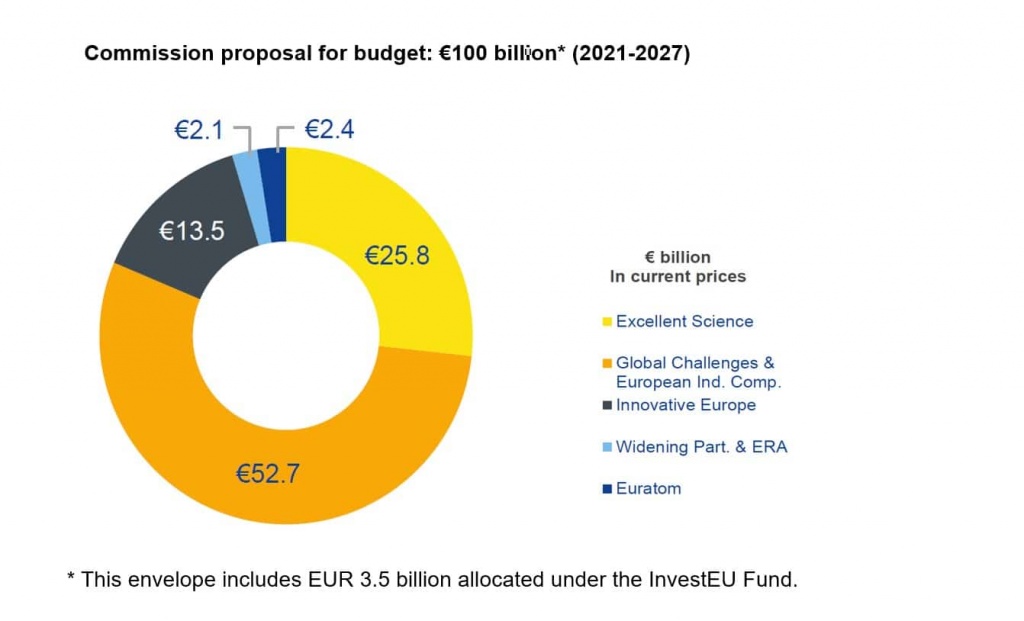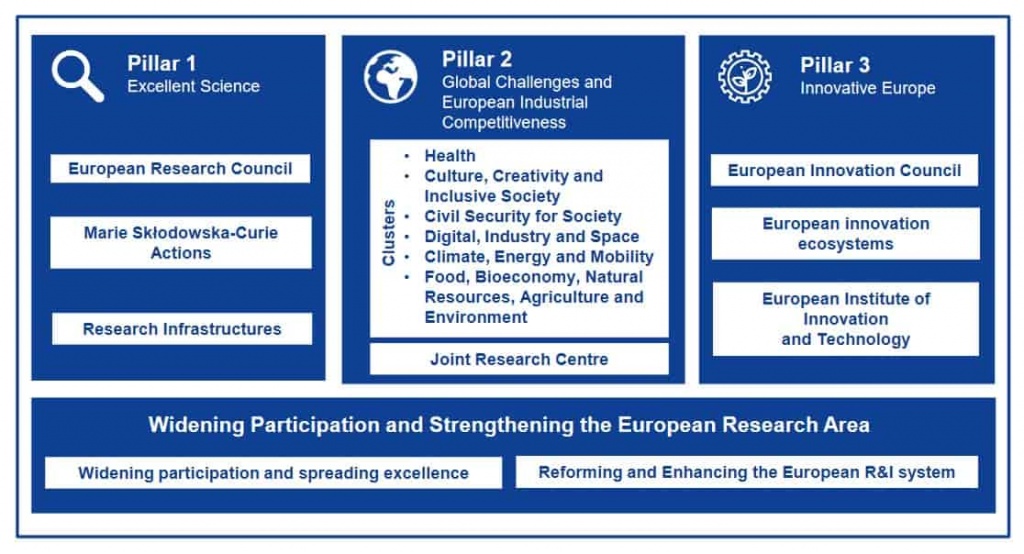The new EIC Accelerator (official work programme right here) in Horizon Europe offers great opportunities for deep-tech SMEs. Competition for EU grants under this scheme is expected to be fierce, even though the target audience for the EIC Accelerator has been narrowly defined as deep-tech, market-creating SMEs. But not every SME is at the technology readiness level (TRL) required for EIC Accelerator funding and not every SME works on disruptive, market-creating technologies. This article provides an overview of alternative EU funding opportunities and where you can learn more about them. Reach out to EFMC to identify the right EU funding opportunity in Horizon Europe with the best chances of success.
What are the EU funding opportunities for SMEs in Horizon Europe?
Start-ups and SMEs should think carefully whether the EIC Accelerator is the right instrument for them. Its simplified application process, mix of open and strategic calls and the combination of EU grant and “patient” equity makes it very attractive. Its pilot suggests that it will be extremely popular and the chances of success may be slim. While the European Innovation Council will have a budget of €10bn, the bulk of the Horizon Europe budget of €85Bn will be available under other EU programmes. Therefore, SMEs should ask themselves there might be more suitable EU funding opportunities in Horizon Europe:
- Does your start-up or SME belong in the deep-tech category? The EIC Accelerator is tailored to deep-tech, disruptive SMEs with market-creating potential. In its analysis of European start-ups on behalf of the European Commission, the Dutch company facing both risks – a higher R&D risk and a market demand risk. Many innovative start-ups and SMEs do not meet these criteria.
- What is the technology readiness level of your envisaged project? To qualify for EIC Accelerator funding, start-ups and SMEs need to have their projects at least at technology readiness levels TRL5-TRL6. This means, the technology must have been validated or demonstrated in the (industrially) relevant environment. Projects with a lower TRL will not be eligible for funding under the EIC Accelerator.
- What is your main motivation for applying for an EU grant? There is a multitude of reasons why SMEs and start-ups apply for EU funding. What is your main reason for seeking an EU grant? Expanding international collaboration, developing process innovation, refining technological processes or fostering knowledge exchange? Or is your innovation in the experimental proof of concept or lab-based validation phase? Or are you seeking EU funding to purchase equipment for research and innovation? In these cases, you will have better chances of success if you explore the EU funding schemes outside the EIC Accelerator.
- What area or technology does the start-up or SME focus on? Horizon Europe is aimed at helping to achieve EU policy priorities. The draft General Introduction to Horizon Europe lists four major impact areas and the technologies underpinning them, i.e. (1) artificial intelligence, data and robotics, (2) cybersecure technology, (3) a digitized, resource-efficient and resilient industry, and (4) research and innovation on health-supporting technologies. The impact areas and the relevant technologies are grouped into six clusters under Pillar II Global Challenges & European Industrial Competitiveness and will be subject to calls for proposals. Here you might find a perfect thematic fit for your start-up or SME.
EU grants for SMEs: Funding opportunities in Horizon Europe
The rough budget breakdown for Horizon Europe illustrates the amount of funding available under the individual Pillars, i.e. Excellent Science (I), Global Challenges and Industrial Competitiveness (II), and Innovative Europe (III). Pillar III covers the EIC Accelerator and the European Institute of Technology with its Knowledge and Innovation Communities (KICs). A big chunk of Horizon Europe funding will be available under Pillar II through focused projects involving the user industry and technology providers as well as under competitive calls.

Source: Horizon Europe, European Commission, May 2019
- Pillar I: Excellent Science (€25.8Bn)
Pillar I provides both bottom-up and top-down funding centred around strategic challenges, usually covering technology readiness levels TRL1-3, research into key emerging technologies and proof-of-concept projects. Pillar I may be relevant for SMEs interested in getting involved in R&I staff exchange, Innovation Training Networks, such as European Industrial Doctorates, or in Individual Fellowships.
- Pillar II: Global Challenges and European Industrial Competitiveness (€52.7Bn)
The six clusters under Pillar II cover (1) health, (2) culture, creativity and inclusive society, (3) civil security for society, (4) digital, industry and space, (5) climate, energy and mobility, and (6) food, bioeconomy, natural resources, agriculture and the environment. Within these clusters there will be Research and Innovation Actions and Innovation Actions. Pillar II also comprises 49 cluster-based European partnerships with EU and associated countries, involving the private sector, foundations and other stakeholders to deliver on global challenges and modernise industry.
- Pillar III: Innovative Europe (€13.5Bn)
Apart from the EIC Accelerator this pillar also covers the EIC Pathfinder (covering TRL1-3) and the EIC Transition programme (covering TRL4-6). They are particularly suitable for breakthrough technologies not yet ready for the EIC Accelerator. Additionally, the European Institute of Technology (EIT) offers opportunities for SMEs as part of its Knowledge Innovation Communities. These large public-private consortia consist of universities, research institutes and private-sector organisations. KICs offer opportunities in the area of digital technology, urban mobility, raw materials, food, manufacturing, health climate and innovative energy.

Source: Horizon Europe, European Commission, May 2019
The complexity and structure of Horizon Europe, the EU’s 9th Framework Programme for Research and Innovation, may feel daunting. Especially for start-ups or SMEs with limited resources to spend on analysing the leaked information about the Horizon Europe strategy, work programmes, model grant agreement and the proposal template, let alone monitoring official EU websites for updates by the European Commission. But others have done this work for you already, for instance EFMC has analysed all draft work programmes and offers both orientation webinars and more in-depth training.
Need help with finding the right EU funding opportunity for your start-up or SME?
Join our 1.5-hour Horizon Europe Orientation Webinar including Q&A for SMEs. The next webinar will be on 26 March 2021. It explains how the EU is becoming a business accelerator, what opportunities Horizon Europe offers for SMEs and the types of EU funding schemes available. Register now for our next Horizon Europe Orientation Webinar.
EFMC offers a regular 1-day in-depth Training on Horizon Europe for universities, research institutions and SMEs that are already familiar with the Horizon Europe concept, but want to learn more about specific aspects of Horizon Europe grants. Our next dates are 22 April, 11 May and 17 June 2021. Register for our 1-day in-depth Training on Horizon Europe.
For the next level in Horizon Europe grant applications, EFMC experts offer a comprehensive 3-day training on the proposal writing process for Horizon Europe projects. Our next dates are 13-15 April 2021. Register for our 2-3-day training on proposal writing for Horizon Europe projects. Should you prefer bespoke in-house training, contact us for in-house trainings on Horizon Europe, Proposal Writing, or Financial Management (including H2020). To get a quotation, reach out to us at info@efmc.eu or by phone at (+372) 604 1400.

